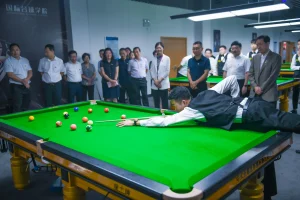How Did China’s Top Major Become the Worst?
It is well known that choosing college majors during the university entrance examination (known as the Gaokao in China) is a stage more miraculous than the stock market. Even the legendary investor Warren Buffett may not always be able to buy stocks at their lowest point, but every year, there are brave students who manage to pick up overlooked opportunities when selecting universities.
In recent years, there has been a surprising decline in enrollment for civil engineering, with the field losing its former allure. It has become almost routine for civil engineering programs to struggle to attract students.
The Rise of Smart Construction
With the decline of civil engineering, some other civil-related professions have added prefixes like “smart” and “intelligent,” embracing a strong sense of technology, quietly rising in prominence.
For instance, the introduction of the Smart Construction major in 2017 at Tongji University marked the beginning of a trend. Since then, more universities have followed suit, with the number of institutions offering Smart Construction programs increasing steadily each year.
As of now, 153 universities have been approved to add new Smart Construction programs, compared to just 70 universities three years ago. Following this trend, there has been a surge in enrollment. According to a document released by the Ministry of Housing and Urban-Rural Development, in 2022, there were 3,562 students enrolled in Smart Construction programs nationwide, which increased to 5,539 students in 2023. Amidst this trend, there has been confusion about what exactly Smart Construction entails.
While it is categorized under civil engineering, the absence of the term “civil” in its name raises suspicions that it may simply be a rebranding of traditional civil engineering. Some even suggest that it is merely a marketing ploy to capitalize on the popularity of computer-related fields. In reality, after analyzing 55 universities offering Smart Construction programs, it is clear that these programs are often established within existing civil engineering departments, without renaming or discontinuing the original civil engineering programs.
Among them, 96.4% of universities have placed Smart Construction within the colleges of Civil Engineering, with only Jilin University of Architecture categorizing it under the College of Modern Industries, sharing a department with the Geomatics program of Remote Sensing Science and Technology.
Not only are the colleges the same, but the course catalogs of the two programs also intertwine.
We sampled six universities that offer both Smart Construction and Civil Engineering programs, and after comparing their curriculum plans, we found that from prestigious universities to regular institutions, Smart Construction includes traditional civil engineering courses such as Structural Mechanics, Soil Mechanics, and Engineering Materials, but also incorporates content on computing, machinery, and economic management, truly embracing the “smart” aspect.

The Cooling Trend of Once Popular Majors
Despite the current backlash against Civil Engineering, if we turn the clock back to a decade or so ago, the ancestors of Civil Engineering also once flourished.
From 2006 to 2015, it was hailed as the “Golden Decade of Architecture and Civil Engineering.” During that bustling period of infrastructure development, not only did skyscrapers rise from the ground, but it also nurtured the glorious peak of the Civil Engineering profession. The number of colleges offering Civil Engineering programs surged from 392 in 2008 to 572 in 2022.
Civil Engineering was riding high on a wave of success, attracting top talents, with a promising future ahead. However, all good things must come to an end.
The nationwide push for massive construction projects under the slogan “To get rich, build roads first” led to a significant increase in urbanization rates from 36.09% in 2000 to 63.89% in 2020. With the pains of transitioning the national development model and the uncertainties in the real estate sector, the soaring urbanization rate signaled a decline in the Civil Engineering industry.
The past glory of Civil Engineering, like a mirage, was overshadowed by the reality of severe supply-demand imbalances caused by the expansion of enrollment to meet the high demand. The emergence of the “Civil Engineering Exodus” was inevitable.
According to Michael’s “2024 China Undergraduate Employment Report,” the proportion of graduates entering the field of construction engineering has been decreasing year by year, with a 46% decrease in this ratio over the past five years, ranking first among 46 occupational categories.
The enthusiasm of young people for the Civil Engineering industry has been waning, leading to discouragement not only among students but also in university admissions, where cutoff scores have been consistently lowered.
Taking the highly competitive Hebei Province as an example, in recent years, among the influential “Top 8 Architecture Schools,” except for a slight rise in the lowest admission rank of Tsinghua University’s Civil Engineering program, most other schools have experienced a decline in admission rankings.
In contrast to previous years, the lowest admission rank of South China University of Technology in Hebei dropped by nearly 7,000 in 2024, while Xi’an University of Architecture and Technology plummeted by over 10,000.
The newly transformed Smart Construction field also fails to stand out. For instance, the Smart Construction program at Shenyang University of Architecture saw a decrease in the natural science admission rank in Liaoning from 41,461 in 2022 to 43,893 in 2024. Although this drop is not as significant as the three-digit drop in Civil Engineering during the same period, the struggle is evident.
To revive declining enrollments, universities are resorting to various tactics, such as including Civil Engineering in early admissions and admissions for students from impoverished backgrounds, merging it with other disciplines for broad admissions… These bewildering enrollment strategies may not be fraudulent, but they certainly give that impression. As for career choices, whether students succeed in “automation” or fail in “Civil Engineering” depends on individual circumstances.

The once prestigious Civil Engineering field, once filled with high-achieving students who had studied hard for years, is now crowded with disgruntled students looking to change majors. The shift from “entrance for high scorers” to “avoid at all costs” is both brief and glorious: missing out on the industry’s prosperity and instead encountering exorbitant housing prices, property market turbulence, and the challenges of Civil Engineering, tasting the bitter fruits of the times.
(Note:Despite the downturn in the infrastructure industry’s market environment, this is not the complete narrative. There is a young man in China, whom we have previously featured, who has chosen a different path. Cao Fengze, a graduate of China’s top university with a degree in Civil Engineering, faced employment obstacles and a sense of unfulfillment. He made the decision to travel to Tanzania to work on building hydropower plants. Three years later, he shared his experiences on Chinese internet platforms.)
Chinese Universities Adapt Majors to Changing Landscape
Not only Civil Engineering has become awkward, but according to statistics, as of July 31st this year, 19 universities in China have issued announcements to revoke or suspend admissions for a total of 99 majors. Among the disciplines that have been removed, Engineering ranks the highest, with the most number of majors being discontinued, followed by Management and Science.
With the continuous adjustment of social and economic structures, there is a noticeable increase in the number of Engineering majors being withdrawn. Similarly, Management majors are also influenced by changes in market demand. With the rapid development of emerging industries such as artificial intelligence, big data, cloud computing, and the Internet of Things, many traditional engineering majors are being phased out, while the trend of establishing new majors combining “Smart +” with traditional engineering is emerging.
The Chinese Ministry of Education has explicitly stated that by 2025, around 20% of university disciplines will be optimized and adjusted. Meanwhile, a new batch of disciplines that adapt to new technologies, industries, formats, and models will be established, while outdated disciplines that do not align with economic and social development will be eliminated.



